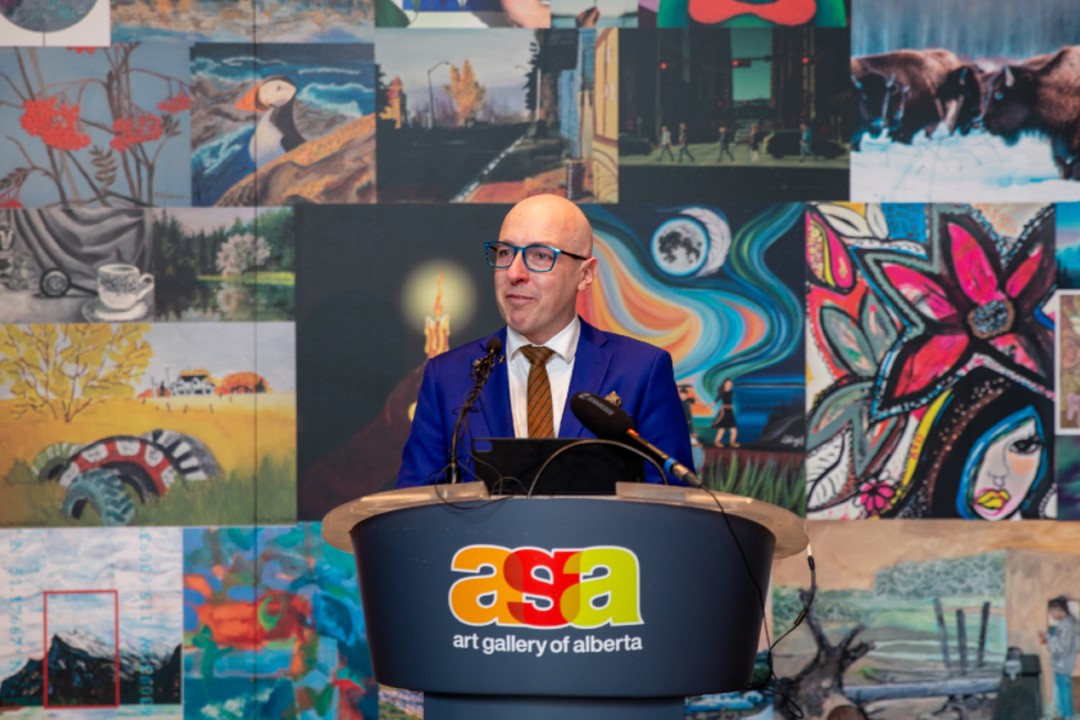Andrew Knack, the city councillor representing Ward Nakota Isga, joined the hosts of Episode 309 of Speaking Municipally shortly after announcing that he's running for mayor in the October municipal election. Here's a quick look at the conversation:
1. Why now?
In September, Knack tearfully announced that he wouldn't be running for re-election as a councillor in Ward Nakota Isga in 2025, saying it was time for a new voice to come forward to represent the ward.
Co-host Troy Pavlek asked Knack why he's aiming for the mayor's chair, and why he's announcing now.
Knack said that he already spends significant time talking to constituents in his ward, but wanted to speak to people across Edmonton before deciding whether to run for mayor. "I wanted to make sure that if I was going to do this, I fully understood what everyone is saying across the city, so that I could come out with a message that would apply to all Edmontonians," he said.
Knack said affordability, safety, and Edmonton's booming population were common concerns that people raised. He added that he started to reconsider his decision not to seek re-election around the beginning of 2025. Since then, United States President Donald Trump's tariffs, and rhetoric, have grown more aggressive, Canada has had a federal election, the prospect of Alberta seeking to separate from Canada has become more serious, and Mayor Amarjeet Sohi has announced he's not running for re-election, meaning there would not be an incumbent progressive candidate for mayor on the ballot.
"All of these factors over the last four months have been playing into me thinking about putting my name forward," Knack said.
2. What's driving Knack's campaign?
Knack told the co-hosts that he's shown through his 12 years on council that he can address the common concerns he hears from Edmontonians. "I know how to take action on these things so we actually can address growth, we actually can create a more affordable city, we can create a safer city. These are all things I've done in my time on council, and looking at where we were headed, I felt that what I wasn't seeing was somebody that was looking to fill that particular void."
Knack said his campaign will be about delivering for the "everyday Edmontonian." When asked to define that, he said there is a perception that citizens have less of a voice at city hall than do wealthy companies, especially real estate developers. He also mentioned the event park proposal, which would give $137.8 million in public funds to the Oilers Entertainment Group, to make his point.
"There is a concern right now from Edmontonians who are feeling like particular developers are sort of running the city," Knack said. "I've been doing this for 12 years — that has not necessarily been an uncommon refrain, but it's certainly different now, and it's more prevalent than I've ever heard before."

Andrew Knack announced in September he would not be running for councillor in Ward Nakota Isga. This week, he threw his hat in the ring for Edmonton's mayor. (Mack Male/Flickr)
3. How will this election be different?
The provincial government recently introduced several significant changes to the municipal election process. One change, introduced in Bill 20, allows for political parties during the upcoming vote and after, at city council. The first political party registered in the city, the Principled Accountable Coalition for Edmonton, recently announced six candidates, and mayoral candidate Tim Cartmell launched his party, Better Edmonton, on May 13.
Knack didn't mince words when describing how he thinks parties will change the municipal election. "I think partisan politics is poison, and it shouldn't be in our local democracy," he said.
Further change driven by the province builds on the change to rules to allow municipal parties. Bill 20 allows a municipal party to raise money and lets a candidate of that party raise money individually, essentially doubling the overall amount candidates in wards can raise. Critics have suggested this allows money and those who have it to play an outsized role in elections. Knack told Taproot earlier in May that Bill 50, once passed, will accelerate this trend, as a candidate's party will now be allowed to divert any money it raises for an overall group of party candidates to specific candidates in specific wards, allowing individual races to potentially become flooded by dollars to help a party's candidate to win.
Knack told the Speaking Municipally hosts that he plans to rely on smaller donations from the aforementioned "everyday Edmontonian" instead of money from bigger players. "It would be my preference to not accept large corporate donations. That has been my approach since the 2017 election," he said.
Knack added that he and his campaign team are still deciding whether he'll continue that approach because running a council campaign is much different from running a mayoral campaign.
The May 23 episode of Taproot's civic affairs podcast included the hosts reminding all mayoral front-runners that they've been invited to appear on the podcast, an update from the Taproot Edmonton newsroom, and a call for listeners to participate in Taproot's election coverage and upcoming listening events. Speaking Municipally comes out on Fridays. Listening and subscription options are all right here.
